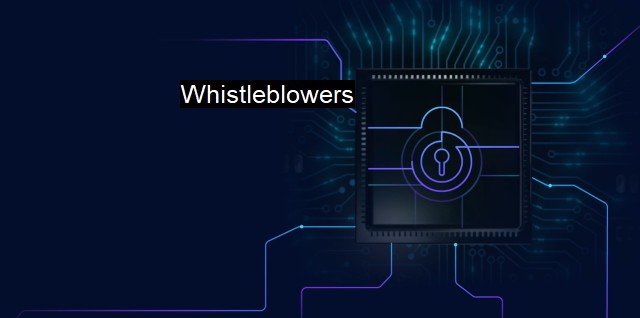What are Whistleblowers?
Ensuring Cybersecurity: The Importance of Whistleblowers in Exposing System Vulnerabilities and Breaches
"Whistleblowers" is a term that is widely used in multiple realms of economy, society, and politics – and even in cybersecurity and antivirus measures. a whistleblower is an individual – primarily an employee or insider of the organization who unveils activities or actions undertaken by an organization, which are illegal, unethical, or contrary to public policy.Information technology processes in organizations' daily operations have significantly increased over the last couple of decades. As a result, organizations should protect the information they amass or utilize from manipulation or unauthorized disclosure. Consequently, because of its importance, cybersecurity is a critical part of many companies' safety arsenal.
In this era of rapid technological upgrade and the subsequent rise of cybercrimes, whistleblowers play a pivotal role. Whistleblowers are crucial sources of information on various cyber wrongdoings, including loopholes in cybersecurity infrastructure and potential antivirus flaws. This capability makes whistleblowers essential contributors to preventing, detecting, and mitigating cyber threats.
Further, there are situations where an organization may intentionally overlook cybersecurity issues for various reasons. These reasons could include cost minimization, ignorance of technical complexities, or intentionally exploiting these security flaws. In such situations, whistleblowers expose these questionable activities/responses to relevant authorities or sometimes even to the public, thus accounting for checks and balances.
Whistleblowing in cybersecurity also represents many challenges. For instance, the act may be viewed as espionage, particularly for national security-related organizations. In some cases, whistleblowers may face the risk of retaliation or legal consequences. Therefore, to protect these individuals, there is a growing need for legislation that ensures whistleblower protection.
The role of whistleblowers in the cybersecurity realm entered the public spotlight with the case of Edward Snowden. Snowden, a former analyst at the National Security Agency (NSA), disclosed a substantial amount of classified information regarding global surveillance activities run by the NSA. He shed light on how governments could exploit weak cybersecurity to gain unauthorized or unethical informational access, subsequently triggering an intense worldwide debate on digital privacy versus national security. This case illustrates the double-edged nature of whistleblowing in cybersecurity.
When it comes to antivirus companies, if these firms adopt unethical practices such as selling customer data or manipulating their products to create cybersecurity gaps unknowingly exploited by cyber criminals, whistleblowers are again critical. They reveal such practices, leading to rectification, enhanced privacy protection, and improved security for users. whistleblowers assist in maintaining transparency and removing the anomalous antivirus activities.
Simultaneously, inappropriate, or malicious whistleblowing, termed "pseudo-whistleblowing," allows individuals to use electronic resources to propagate potentially harmful information. This further emphasizes the fine line between beneficial and harmful whistleblowing.
Whistleblowers in the context of cybersecurity and antivirus measures present a paradox. On one hand, they help solve, uncover, or prevent unethical practices by revealing concealed information and providing vital information to handle cyber threats effectively. on the flip side, there is the risk of potentially disclosing sensitive information, violating privacy norms, and facilitating cyber threats. Despite their controversial role, whistleblowers undeniably form an integral part of cybersecurity, adding one more tier in the multi-faceted field of informational and system protection in the digital age.

Whistleblowers FAQs
What is a whistleblower in the context of cybersecurity and antivirus?
A whistleblower in cybersecurity and antivirus is an individual who reveals information about the wrongdoing or unethical behavior of an employer or organization related to cybersecurity or antivirus. They may report security violations, data breaches, or other illegal or unethical practices.What protections are available for whistleblowers in the cybersecurity and antivirus industries?
There are several laws and regulations that protect whistleblowers in the cybersecurity and antivirus industries. These include the Sarbanes-Oxley Act, Dodd-Frank Act, and False Claims Act. These laws provide protection against retaliation, such as termination or demotion, for reporting illegal or unethical activities.What are the potential consequences for an organization if a whistleblower exposes a cybersecurity or antivirus issue?
The consequences of a whistleblower exposing a cybersecurity or antivirus issue can vary depending on the severity of the issue. It can lead to legal and financial ramifications for the organization, including fines and legal fees, loss of reputation, and reduced customer trust. It is important for organizations to have proper cybersecurity and antivirus measures in place to prevent issues from occurring in the first place.What should a whistleblower do if they suspect illegal or unethical practices related to cybersecurity and antivirus are taking place within their organization?
If a whistleblower suspects illegal or unethical practices related to cybersecurity and antivirus are taking place within their organization, they should report it to the appropriate authorities or internal compliance team. They should also document any evidence they have of the wrongdoing and be prepared for potential retaliation. It is important for whistleblowers to seek legal counsel to understand their rights and protections under the law.| | A | | | B | | | C | | | D | | | E | | | F | | | G | | | H | | | I | | | J | | | K | | | L | | | M | |
| | N | | | O | | | P | | | Q | | | R | | | S | | | T | | | U | | | V | | | W | | | X | | | Y | | | Z | |
| | 1 | | | 2 | | | 3 | | | 4 | | | 7 | | | 8 | | |||||||